What is ERP Software?
ERP, or enterprise resource planning software, is an all-encompassing business management software suite of integrated applications utilized by organizations to automate and manage their core business processes. These processes span various functional areas, including finance, human resources, supply chain management, manufacturing, and customer relationship management (CRM). By consolidating these functions into a unified system, ERP software provides organizations with real-time visibility and control over their operations. This integration facilitates seamless coordination between different departments, enhances decision-making capabilities with accurate data insights, and improves overall operational efficiency.
ERP software is crucial for businesses aiming to streamline workflows, minimize manual tasks, reduce errors, and align resources effectively to support in enhancing organizational productivity and responsiveness to market demands.
Overview of the Global ERP Market
The global ERP market is witnessing significant evolution driven by technological advancements and widespread digital transformation initiatives. This market has shown robust growth, buoyed by increasing adoption across diverse industries seeking to streamline operations and boost efficiency. Cloud ERP solutions, in particular, have gained prominence for their scalability, flexibility, and cost-effectiveness compared to traditional on-premises systems. Organizations are increasingly opting for cloud-based deployments to leverage benefits such as real-time data insights and reduced IT infrastructure costs.
Digital transformation is crucial in shaping ERP systems, integrating advanced technologies like AI, machine learning, IoT, and predictive analytics. These innovations enable predictive forecasting, automated decision-making, and enhanced business intelligence capabilities, empowering businesses to make data-driven decisions swiftly. Market segmentation reveals varying adoption rates across different regions and industry verticals, with North America and Europe leading in market share while Asia-Pacific showcases rapid growth potential.
The competitive landscape of the ERP market is intense, with leading vendors driving innovation to stay ahead. Future trends include heightened focus on cybersecurity, enhanced integration capability, and the emergence of industry-specific ERP solutions tailored to unique sectoral needs. Looking forward, the ERP market is poised for continued advancement as businesses prioritize efficiency and agility to thrive in a competitive global economy shaped by digital transformation.
Why Is ERP Software Important for Modern Businesses?
ERP software gets every operation in sync, making businesses more responsive to market changes. Let us discuss its crucial role in modern businesses:
Integrates Business Processes
ERP software unifies critical functions like finance, HR, supply chain, manufacturing, and CRM into one system. This eliminates data silos and enhances collaboration across departments, ensuring seamless operations.
Provides Real-Time Data
ERP systems offer real-time analytics and reporting by centralizing data from all departments. This enables prompt, informed decision-making, making businesses more agile and responsive to market changes.
Boosts Efficiency and Productivity
Automating day-to-day tasks and workflows, ERP software reduces manual effort and errors. This increases the operational efficiency and frees up resources for strategic initiatives, enhancing overall productivity.
Supports Scalability and Adaptability
Modern ERP solutions are scalable, allowing businesses to grow seamlessly. Whether adding new users or integrating with third-party applications, ERP software provides the flexibility needed to support expansion.
Ensures Compliance and Manages Risk
ERP systems help comply with regulations and industry standards by ensuring data accuracy and security. They also offer robust risk management tools to identify and mitigate potential risks proactively.
Saves Costs and Offers ROI
Despite the initial investment, ERP software offers long-term cost savings by improving efficiency, reducing inventory costs, and optimizing resource utilization. This leads to a high return on investment (ROI) over time.
The Need for Cloud ERP Software
Scalability, cost efficiency, and accessibility drive the gaining popularity of cloud ERP software. Unlike traditional systems, cloud ERP provides businesses with flexible, subscription-based solutions that eliminate hefty upfront investments and maintenance costs. It enables real-time data access from any location, enhancing remote work and collaboration.
Additionally, cloud-based solutions include robust security, automatic updates, and seamless integration with other applications, supporting improved data analytics. Embracing the cloud technology is essential for seeking agility, efficiency, and competitive advantage in modern businesses.
What are Common ERP Software Implementation Challenges?
ERP software implementation can be a complex undertaking and comes with various challenges; however, if done strategically, it can bring significant improvements to a business. Before getting to choose the ERP software, let us look into the potential challenges to ensure adequate precautions are taken in advance.
Data Migration: Moving vast amounts of business data from existing software to a new ERP system can be a time-consuming and error-prone process. Data quality issues can also arise if the old data is not properly cleansed and standardized.
Change Management: Transitioning employees to a new system requires effective change management strategies. Resistance to change, lack of training, and difficulty adapting to new workflows can hinder adoption and impact the success of the implementation.
Project Management: ERP implementations involve multiple stakeholders, phases, and tasks. Poor project management can lead to delays, budget overruns, and missed deadlines.
Integration Challenges: Integrating the ERP with existing software systems can be complex, requiring customization and additional development efforts. Compatibility issues and data exchange problems can also arise.
Cost Considerations: ERP software licenses, implementation costs, and ongoing maintenance fees can represent a significant investment for a business. Failing to properly budget for these expenses can strain resources.
Scope Creep: The initial project scope can easily creep as new features and functionalities are identified during implementation. This led to operational delays, budget overruns, and a loss of focus on core objectives.
Security Concerns: Migrating data and integrating systems can introduce new security vulnerabilities. Ensuring robust security measures are enabled is crucial to protect sensitive business information.
Business Disruption: ERP implementation can disrupt daily operations and workflows. Careful planning and communication are essential to minimize downtime and maintain business continuity.
Top 10 Best ERP Software
Focus X
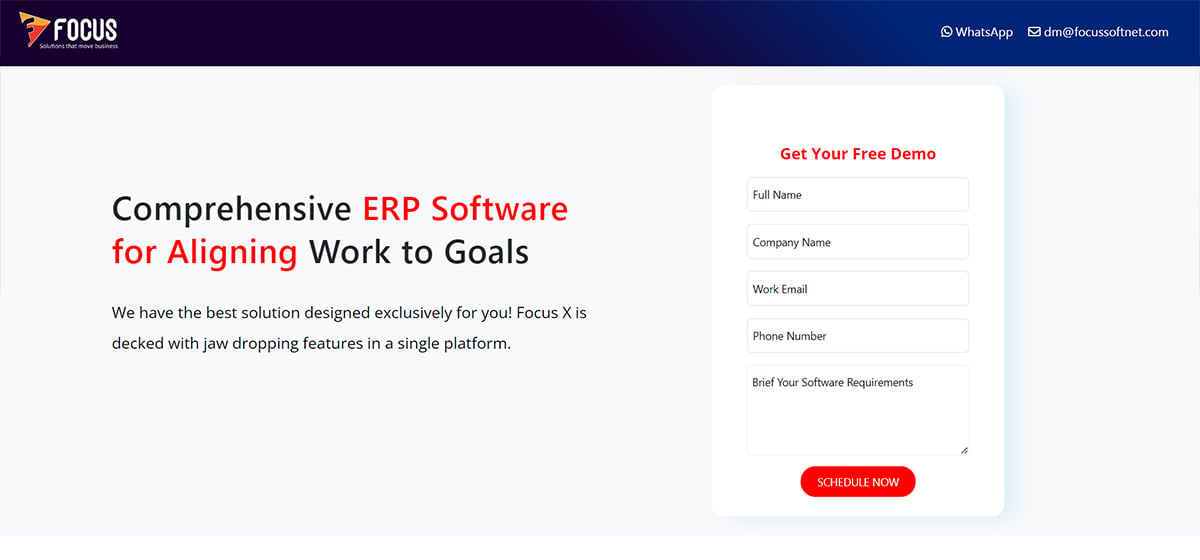
Focus X is a modern ERP solution designed for speed and flexibility, featuring a user-friendly interface that allows for quick implementation. Unlike one-size-fits-all ERP software, Focus X adapts seamlessly to your workflows. Whether managing a global operation or handling multiple languages and currencies, it simplifies international business operations effortlessly. The cloud ERP system is built to scale alongside your company's growth requirements. To future-proof your business, Focus X incorporates newer technologies, including artificial intelligence (AI), machine learning (ML), and more, to enhance operational efficiency and provide valuable insights. Moreover, it also integrates seamlessly with existing applications, ensuring unified access to critical data. Customizable to align perfectly with your unique business processes, the ERP solution empowers operational excellence and facilitates long-term growth for your modern enterprise.
Features:
- All-in-one system to manage finance, human resources, marketing, sales, services, and other departments.
- Offers real-time analytics, customizable dashboards, and report generation capabilities.
- Integrates 3rd-party applications and supports API connectivity.
- Prioritizes role-based access control, data encryption, and other security requirements.
- Support customizable workflows and scales as the business grows.
- Ensures compliance with national tax regulations of countries across the globe.
- Available in flexible deployment options – on cloud, on-premise, and hybrid.
Drawbacks
- Although Focus X includes features with broad industry coverage, some companies may require additional customization to optimize their specific workflows.
Oracle ERP
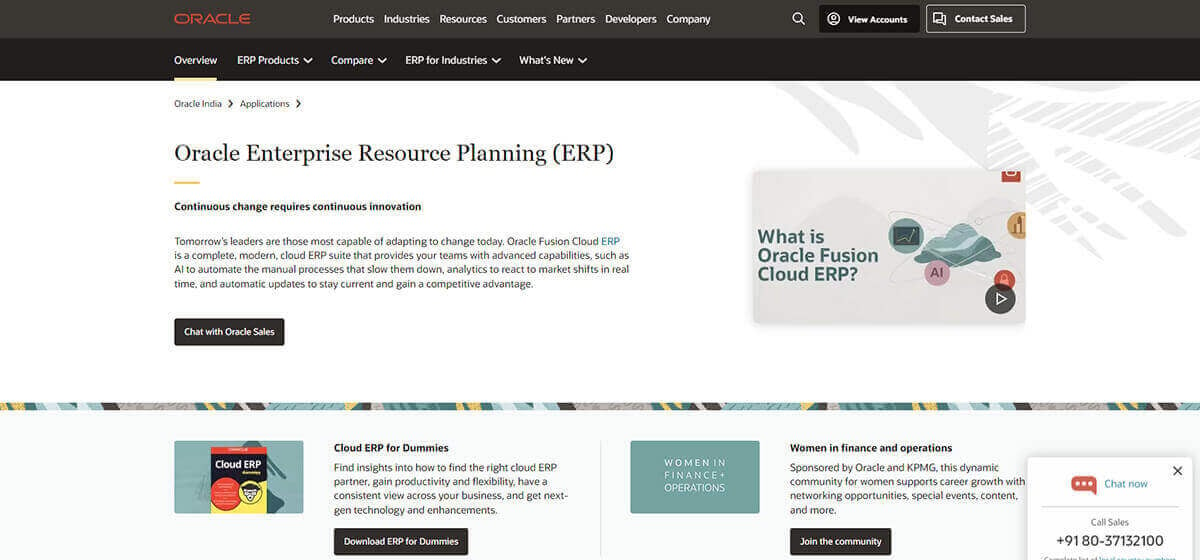
Oracle Cloud ERP is another premier ERP software solution. Tailored for enterprises of all sizes, it delivers a complete set of cloud-based enterprise resource planning tools. These tools enhance operational efficiency across supply chain management, financial oversight, project management, and more. Operating in the cloud, Oracle Cloud ERP enables employees across departments to have real-time access to critical data, regardless of their device or operating system. Integrated modules span all facets of business operations, fostering seamless collaboration across teams.
Features:
- AI and BI functionalities are integrated for analytical and business intelligence purposes.
- Automation of many business tasks frees up employee time from repetitive duties.
- Secure cloud services are supported by Oracle’s global infrastructure.
- Various modules are included, such as accounting, revenue management, procurement, portfolio and project management, and more.
Drawbacks
- Integration with other applications is a bit difficult.
- Need to be more flexible for ease of use.
SAP ERP
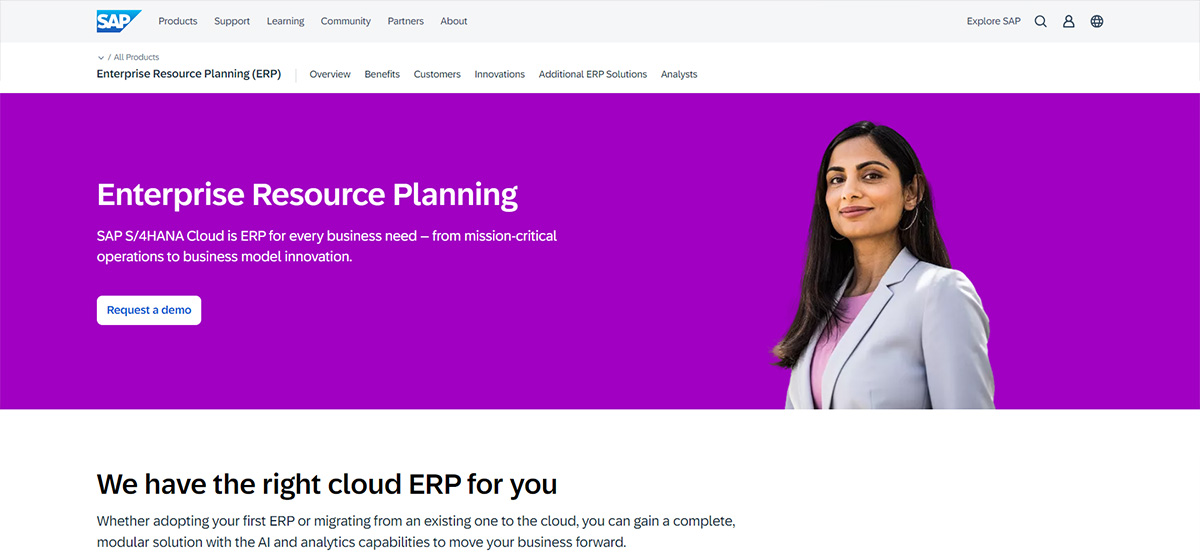
SAP ERP solution centralizes data into a unified hub, facilitating informed decision-making. Offering both on-premise and cloud deployment options, the software caters to individual business needs. Furthermore, its robust data management capabilities and HR streamlining features solidify SAP as a strategic partner, driving operational efficiency and growth.
Features:
- Facilitates production cycle forecasting and supports decision-making.
- Offers currency conversion capabilities.
- Ensures compliance with tax regulations across more than 40 countries.
- Automates management of accounts receivable data from clients to minimize manual input.
- Provides detailed analysis of historical service performance using data from billing and operations departments.
- Includes various modules such as HR, attendance, risk, accounting, and profitability analysis, among others.
Drawbacks
- SAP ERP may not easily integrate with existing systems and third-party applications and may require some re-engineering.
- It has a long learning curve. New users and admins need thorough training and ongoing support.
- The system has limited flexibility in switching to alternative ERP solutions or modifying existing systems.
Acumatica ERP
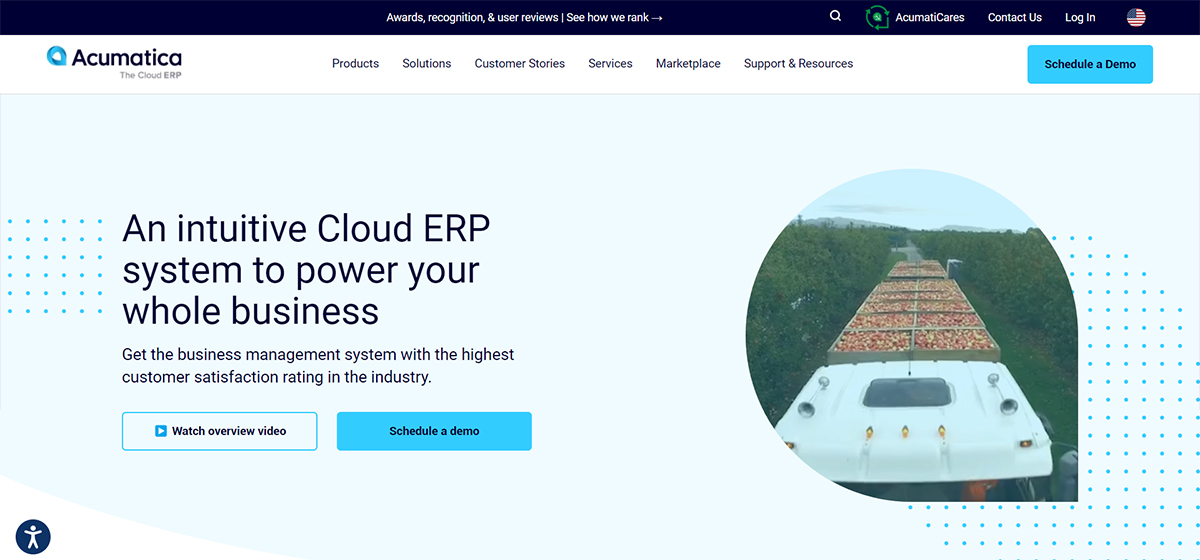
Acumatica ERP software is renowned for its versatility and comprehensiveness, specifically engineered to enhance operational efficiency across a wide array of industries. This robust platform is highly regarded for its flexibility and scalability, providing tailored cloud-based ERP functionalities that seamlessly address the requirements of both small to mid-sized businesses and larger enterprises alike. Its adaptive nature allows organizations to effectively streamline and optimize their business processes, regardless of their industry sector or scale of operations.
Features:
- Offers insights into the operational and financial performance of the organization.
- Integrates various modules, including distribution management, financial management, project management, human resources, field service management, manufacturing management, and other functionalities, into a unified system.
- Support multi-currency billing.
Drawbacks
- Customizing the system may require advanced technical expertise and could be time-consuming.
- Integration with 3rd-party systems might require additional configuration.
- Some users may find the UI less intuitive compared to other ERP systems.
Sage X3
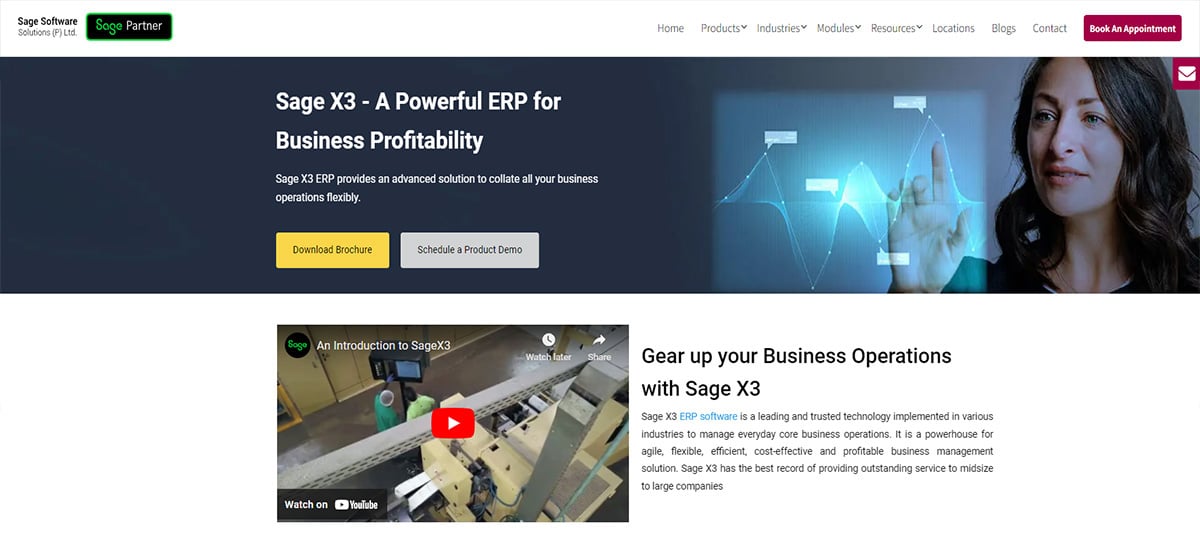
Sage X3 is an ERP solution crafted for diverse industries, seamlessly integrating with finance, supply chain, manufacturing, and distribution functions. It provides advanced financial management, real-time analytics, multi-currency capabilities, and comprehensive inventory management. The user-friendly interface and adaptable deployment options in Sage X3 enables businesses to streamline operations, enhance efficiency, and foster growth in the global marketplace.
Features:
- Accessible via the cloud or on-premise servers
- It is compatible with other applications
- Delivers comprehensive business performance reports across various metrics
- Provides dedicated customer support
Drawbacks
- Processing large volumes of data is constrained by several limitations.
- Additional support may require more payment.
Microsoft Dynamics 365
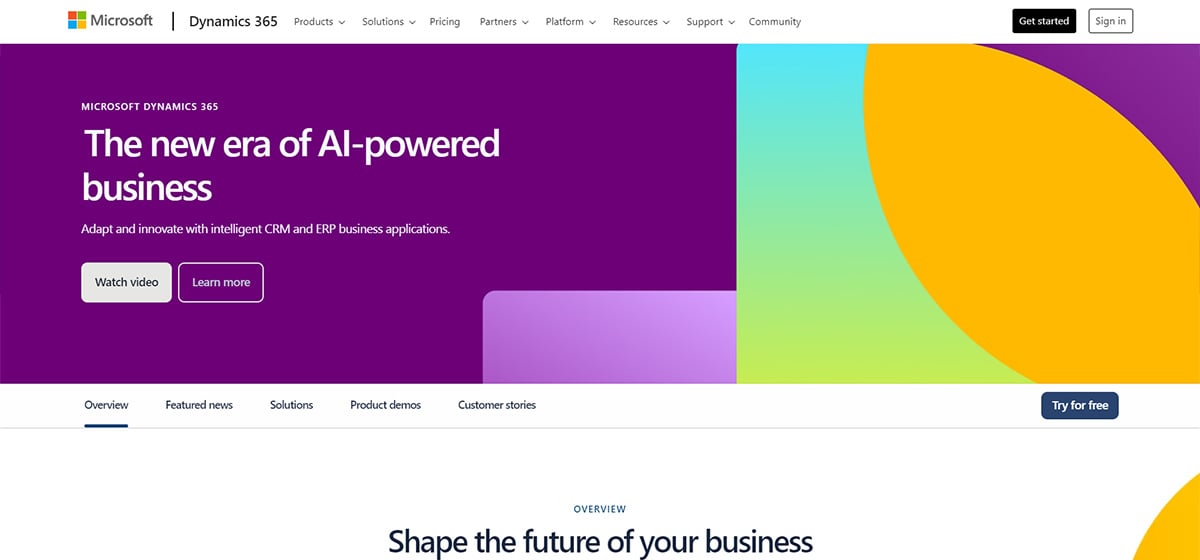
Microsoft Dynamics 365 includes a comprehensive set of business management tools available in both cloud and on-premise versions. It offers a variety of tools aimed at enhancing the efficiency of different business operations, including sales, human resources, customer relationships, and supply chain management.
Features:
- Provides a fully functional 30-day free trial
- Includes a mobile app for efficient customer engagement and workplace productivity
- Boasts a powerful, advanced search capability
- More cost-effective compared to other ERP software alternatives
- Comprises several modules, such as Finance & Operations, Customer Support, Sales, Commerce, Marketing, and Human Resources
Drawbacks
- Some users have reported issues with automatic sign-outs
- Performance issues with the reporting tools have been noted
QAD Adaptive ERP
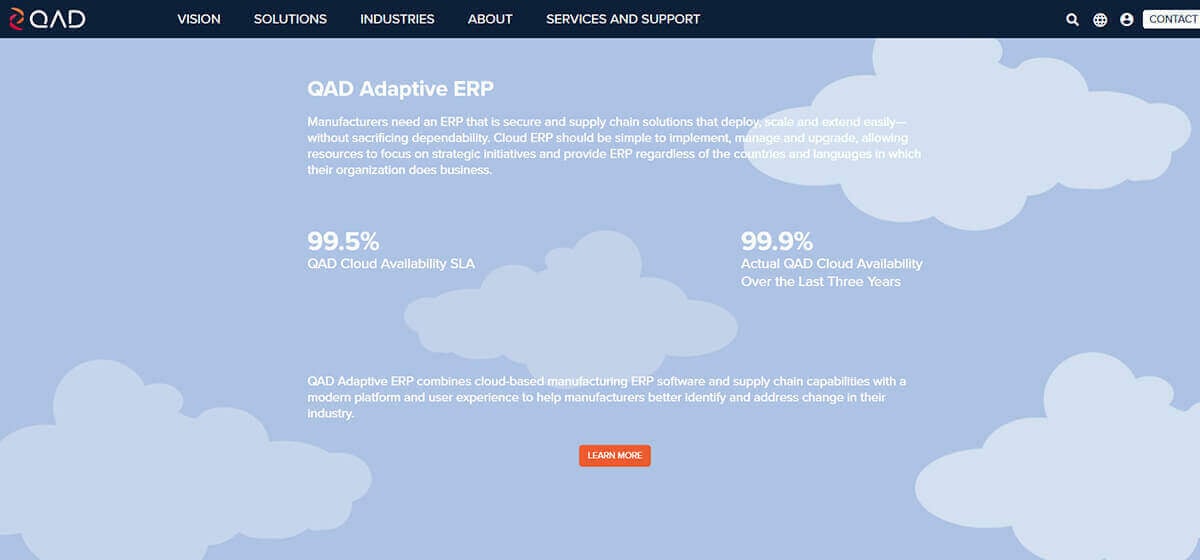
QAD Adaptive ERP is a cloud-based ERP solution designed for manufacturing businesses in sectors such as consumer products, automotive, high-tech, and food and beverages. It offers extensive customization options and supports multiple languages and currencies.
Features:
- Improve strategic sourcing to optimize both direct and indirect procurement processes
- QAD's mobile app lets users create, access, and share valuable information instantly from their smartphones
- Support tax compliance of 66 countries across the globe
- Includes modules for all functions such as finance, sales, customer management, supply chain, human resources, and others.
Drawbacks
- Involves significant manual data entry, which runs counter to the efficiency goals of ERP software.
- Filtering large datasets is time-consuming.
Ramco ERP
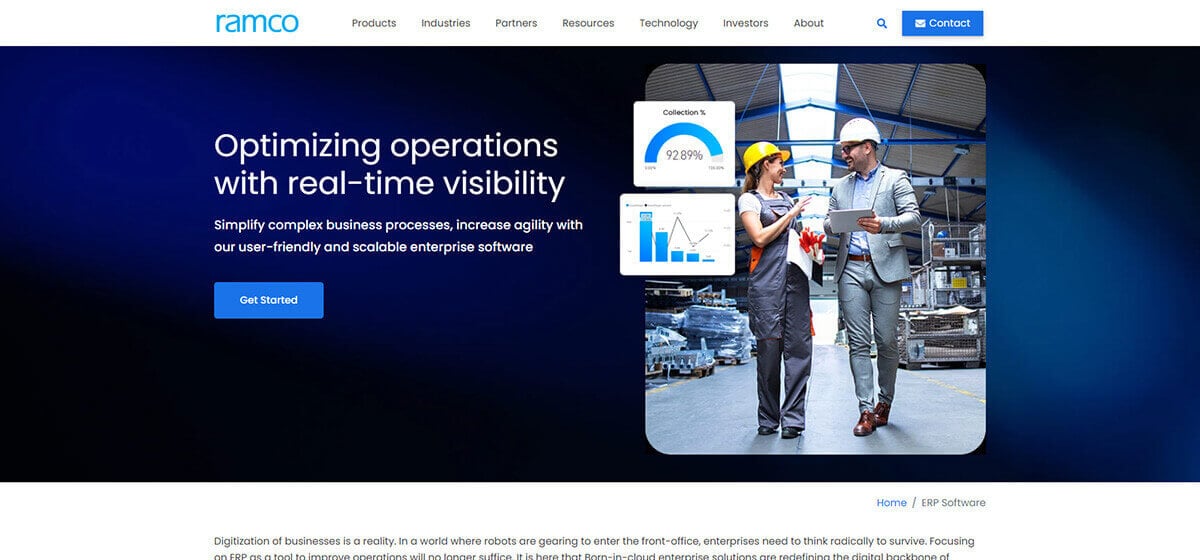
Ramco ERP is an affordable software solution enhanced by AI and ML technologies. The ERP software is ideal for medium and large businesses seeking to streamline essential business operations.
Features:
- Adopts a flexible workflow-based approach.
- It integrates face recognition, chatbots, and other intelligent technologies and tools.
- Offers various modules including HR, Payroll, facilities management, asset management solutions, and more.
Drawbacks
- Users may encounter issues with data migration.
- Documentation lacks detailed information about product features.
ERPNext
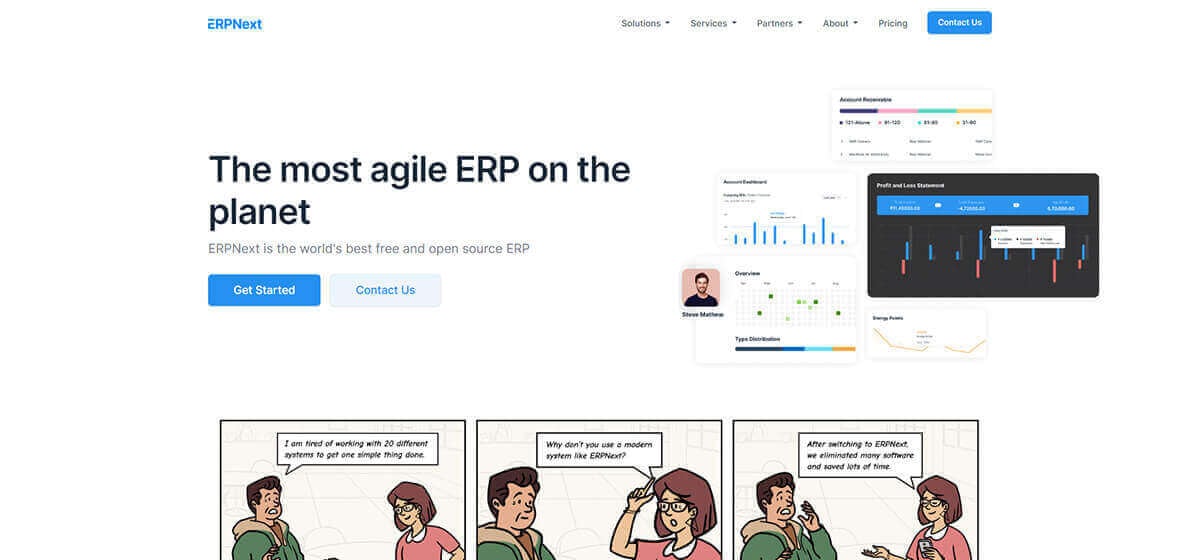
ERPNext is an advanced open-source Enterprise Resource Planning software tailored for small and medium-sized businesses, offered in both on-premise and cloud-based versions. It facilitates expense tracking, payroll management, performance appraisal, and the monitoring of leads and new opportunities.
Features:
- Real-time charts for dynamic data visualization
- The software itself is free of cost, with professional services such as implementation and support available on a pay-as-you-go basis tailored to usage levels.
- Applicable across diverse industries, including retail, healthcare, agriculture, non-profit, manufacturing, and e-commerce.
- Comprehensive modules for customer relationship management, sales management, purchase management, inventory management, accounting, help desk, and asset management.
Drawbacks
- Some users find the ERPNext documentation overly technical.
- The platform may be perceived as inflexible for certain customization needs.
Epicor ERP
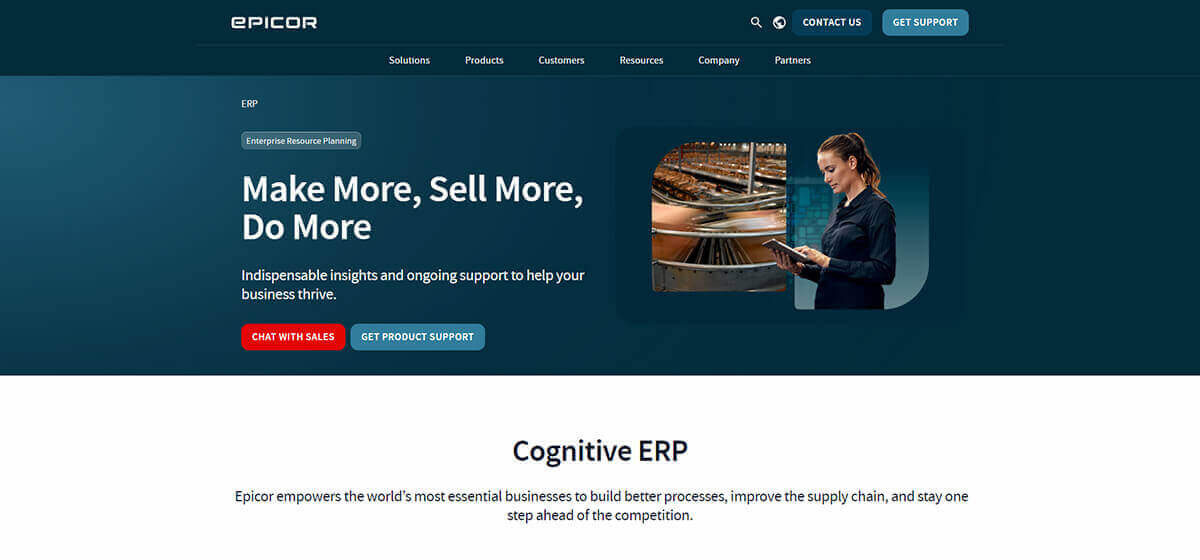
Epicor is the provider of modern ERP software, offering business management solutions designed to streamline business process management across organizations. It is utilized by businesses of varying sizes and industries to enhance efficiency and maximize return on investment (ROI).
Features:
- Facilitates demand forecasting and aligns production capacity accordingly.
- Comprehensive cost management and financial control capabilities.
- Real-time monitoring of processes tailored for different businesses.
- Encompasses modules for financial management, supply chain, e-commerce, production management, point of sale, payment processing, and more.
Drawbacks
- Complex implementation and customization processes.
- The software lacks an intuitive interface
Factors to Consider When Choosing an ERP Software
Selecting the right ERP software is crucial for the success of your business. Here are several key factors to consider:
Vendor Reputation
Research the vendor’s track record, customer reviews, and industry reputation. A reliable vendor will offer better support and updates.
Budget
Calculate the overall cost of ownership, which encompasses licensing fees, implementation, maintenance, and any additional expenses. Compare this with your budget to ensure affordability.
User-Friendliness
The software should be easy-to-use with an intuitive interface for extensive utilization. Consider the learning curve and the amount of training required for your team.
Security
Ensure the ERP system has robust security features to protect sensitive business data. Check for data encryption, access controls, and compliance with industry standards.
Flexibility
Check the software's ability to customize its features and integrate with your existing systems and third-party applications. Integration with 3rd-party apps can save time and reduce errors.
Scalability
Ensure the ERP solution can grow with your business. It should be capable of handling increased workloads and additional users without significant changes or additional costs.
Future Proof Your Business with Focus ERP Solutions
Leverage scalability, advanced customization, and seamless integration capabilities of Focus ERP solutions to adapt to changing market demands and operational needs. With robust security features, continuous updates, and both cloud and on-premise options, these systems ensure your business data remains secure while staying at the forefront of technological advancements. The user-friendly interface and exceptional customer support further ensure maximum utilization of the system, keeping your business agile, competitive, and ready to seize future opportunities.
ERP Articles
- What does ERP Stand for?
- What is the Cost of an ERP System?
- What are the Essential Modules of an ERP System?
- What are the Advantages of an ERP System?
- What is ERP Software?
- How does ERP Differ from CRM?
- How do you Implement an ERP System?
Frequently Asked Questions (FAQs)
What are the top components of ERP?
The specific components of an ERP system can vary according to the need of the business. Some of the key and most used modules are asset, business intelligence, CRM, financial management, HR, inventory, supply chain, and warehouse.
How much does ERP software cost?
The cost of ERP software varies depending on factors such as the number of users, required features, and selected modules. Additional expenses, such as training, may also affect the overall cost.
Can ERP software be accessed remotely?
Traditional, on-premise ERP software is not accessible remotely. However, modern cloud-based ERP solutions can be accessed remotely from any location and device with an internet connection, including desktops, mobiles, and tablets.
What is the role of data analytics in ERP software?
ERP software facilitates the collection, storage, and analysis of business data from various operations, thereby enhancing overall efficiency.
How does ERP software integrate with other business systems?
ERP systems can directly import data from other applications via dedicated interfaces, which are considered the most secure and efficient method. Alternative methods include third-party web services and file-based integration, though these are typically less secure.
Can you customize ERP software?
Many high-quality ERP solutions offer customization options, allowing the software to be tailored to address specific issues and meet the unique requirements of your organization.
